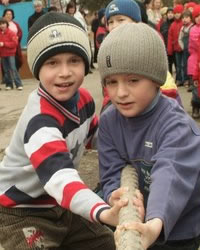Balkar in Uzbekistan

Photo Source:
Anonymous
|
Send Joshua Project a map of this people group.
|
| People Name: | Balkar |
| Country: | Uzbekistan |
| 10/40 Window: | Yes |
| Population: | 900 |
| World Population: | 130,600 |
| Primary Language: | Karachay-Balkar |
| Primary Religion: | Islam |
| Christian Adherents: | 0.00 % |
| Evangelicals: | 0.00 % |
| Scripture: | New Testament |
| Ministry Resources: | Yes |
| Jesus Film: | Yes |
| Audio Recordings: | Yes |
| People Cluster: | Caucasus |
| Affinity Bloc: | Eurasian Peoples |
| Progress Level: |
|
Introduction / History
The Balkars are a Turkic-speaking people whose ethno-genesis remains unclear. They originally lived in homes made of mud and wood. Today, their houses are built with brick or stone and have tile or slate roofs. The homes usually have two stories and most have porches.
Most live in Russia's mountainous southwest. There are a few in nearby Central Asian countries such as Uzbekistan, Kyrgyzstan and Kazakhstan. A very small number are in the United States.
What Are Their Lives Like?
The life of a shepherd has never been easy. In ancient times, we read of the shepherd boy David, who fought against wild animals to save his flock. For centuries, the historically-Muslim Balkar people have lived in the highlands of the Caucasus Mountains (southern Russia) in the province of Kabardino-Balkaria, shepherding their flocks and their livestock. This livelihood is passed from father to son, beginning at a very young age. It's never-ending, strenuous work. Expanding their property to accommodate increased herds is something shepherds strive for, since a man's fortune is ranked by the number of cattle or sheep he owns.
The Balkar people are traditionally mountain-dwellers, but the scarcity of usable land has forced many to move to cities for education and jobs.
What Are Their Beliefs?
There is a small group of believers among the Balkar people. In 1957 Ibrahim became the first Balkar believer. He found Jesus earlier while living in a foreign land under the deportation of Stalin. It would be another 32 years until another Balkar would come into the Shepherd's fold--in 1989--and a third became a follower of Jesus in 1991 as the Iron Curtain of the Soviet Union was torn down. The small group of Christians struggles to develop Christian practices in a culture where every aspect of life from birth to marriage, to death, is governed by folk-Islamic and Balkar traditions. Pray that they would discern the freedom of Christ in their worship and in their communal relationships.
What Are Their Needs?
Several adolescents prayed to receive Christ at summer camp, but have no ongoing Christian influence in their lives, so pray that the Holy Spirit will continue to nurture them.
The New Testament has been translated into the Balkar language. Additional evangelistic tools, such as the JESUS Film, the Magdalena film, and Balkar Worship Music, are available to the Balkar people. They need easy access to these evangelistic tools in Uzbekistan.
Prayer Points
Ask the Lord to send loving Russian Christians to minister life to their Muslim neighbors.
Pray that the Holy Spirit will soften the hearts of the Balkar people toward the gospel.
Ask God to call forth teams of intercessors who will rise up and faithfully stand in the gap for the Balkar.
Pray for the salvation of key Balkar leaders who will boldly proclaim the gospel.